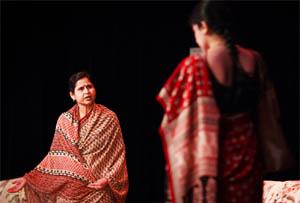Kanyadaan (5/14/2010)

It is with much anticipation that I attended the opening night show of Kanyadaan, a play written by Vijay Tendulkar and directed by Pratidhwani’s Agastya Kohli. The reasons for my enthusiasm were multifold; for one, I’ve been a fan of Agastya’s (and Pratidhwani’s) work for a few years now, and second, I had personally worked with all members of Kanyadaan’s talented cast in last year’s incisive political satire, Ek Tha Gadha, Urf Aladad Khan. But most of all, from what I knew of the play (and the playwright), it promised a complex plot of important societal concerns that the actors, no doubt, would find challenging to portray, and the audience, perhaps, would find equally challenging to process.
Given the challenging complexity of the characters, the performances by the cast were considerably accomplished. Jayant Bhopatkar, playing Nath, fills the stage with his booming, bombastic monologues that reek of a nauseating brand of “democratic” patriarchy. Nanda Tewari, as Nath’s wife Seva, plays beautifully, his complicit complement in maintaining the status quo, carrying that curious blend of feminist independence and practical subservience that is so characteristic of many of us empowered (Indian) women. But the actors who held my eye the most were Aditi Chaubal, playing Jyoti, and Ankur Gupta, playing Arun.
It couldn’t have been easy to step into the shoes of an abused woman, trapped between her idealistic upbringing and her misplaced muse, or those of an oppressed dalit flitting between mouthfuls of crass expletives and self-flagellating, indulgent remorse. I found my heartstrings empathetically connected with Jyoti throughout the play, beyond reason – beyond the need to understand, judge, or admonish her. And, quite paradoxically, I found Arun’s condition just as poignant; he too was an anchor for my heartfelt attention, once again, beyond my need to understand, judge, or admonish him. Both Aditi and Ankur came out on top, bringing forth with surprising ability the complexity and contradictions of these two central characters, each of whom manifests the societal conditions and conditioning that Tendulkar wants us to consider.
Bhushan Mehendale, playing the support role of Jyoti’s brother Jai Prakash, embodies to great effect the emasculation of his father’s domineering presence and the confusion and repressed frustration of an under-expressed youth. Even C.P. Ramakrishnan and Ravi Sathyam, appearing briefly as insolent sidekicks of Arun, demonstrate with their body language alone that no role is a small one. The performances left no doubt in my mind that Kohli selected a great cast and nurtured the best out of them.
In terms of storyline flow, on occasion the rapid-fire pace of the deliveries disabled me from stopping to ponder, to read more between the lines, to connect more fully to the complex characters, especially with Jyoti’s and Arun’s. I missed the whitespace – the larger canvas that might have better held and cradled the complexities and contradictions portrayed – and for this reason alone, some of the turns in the plot may have come across as somewhat simplistic and not-so-believable. Yet, a tight cadence was necessary to keep the intensity and tension of the storyline; so, achieving a fine balance was undoubtedly no mean task.
My heartfelt kudos go to director Agastya Kohli and the entire cast and crew of Kanyadaan, for taking on this challenging subject and play, and for orchestrating yet another thoughtful production for the Seattle Indian diaspora.
Cross-posted from Pratidhwani